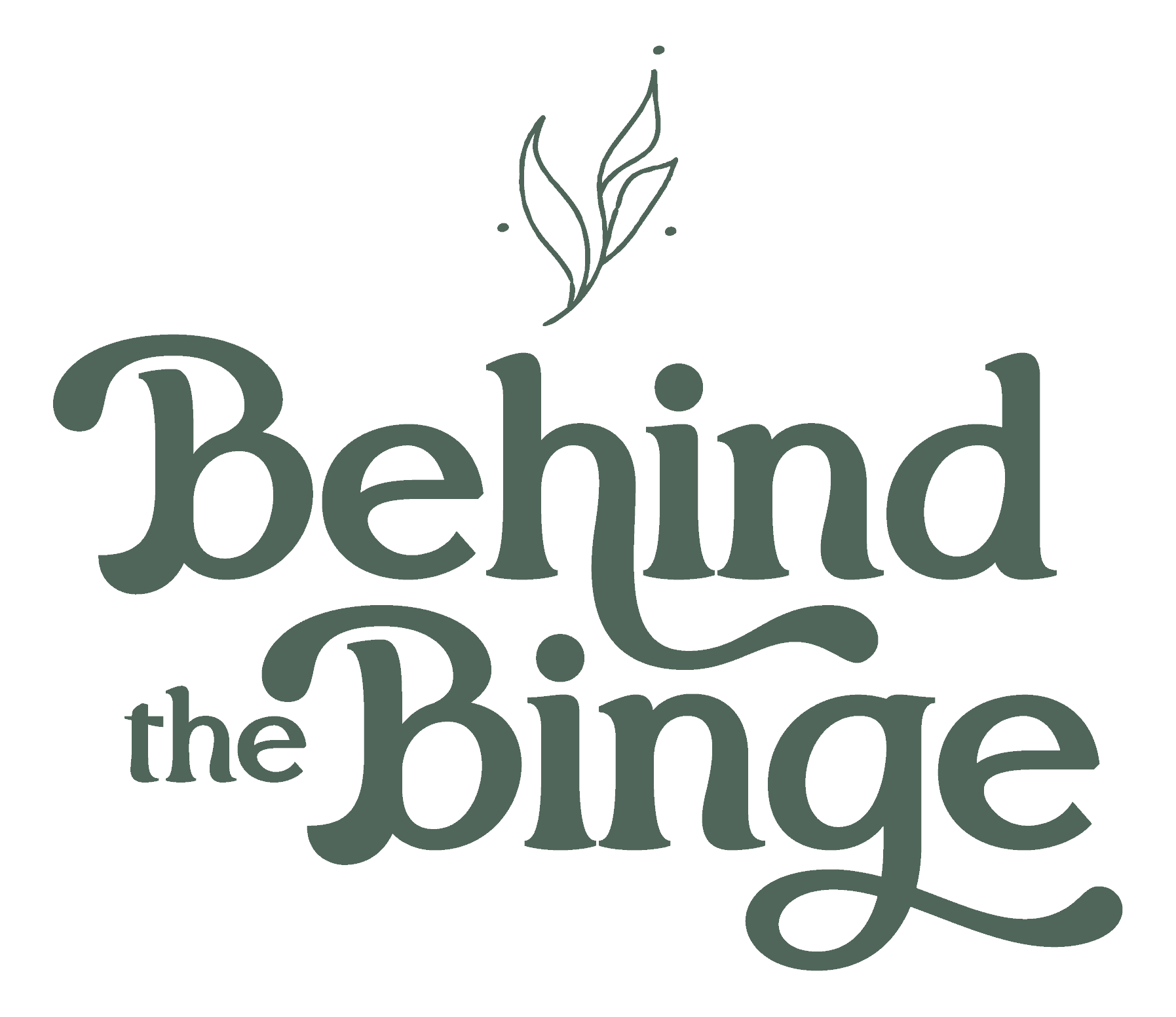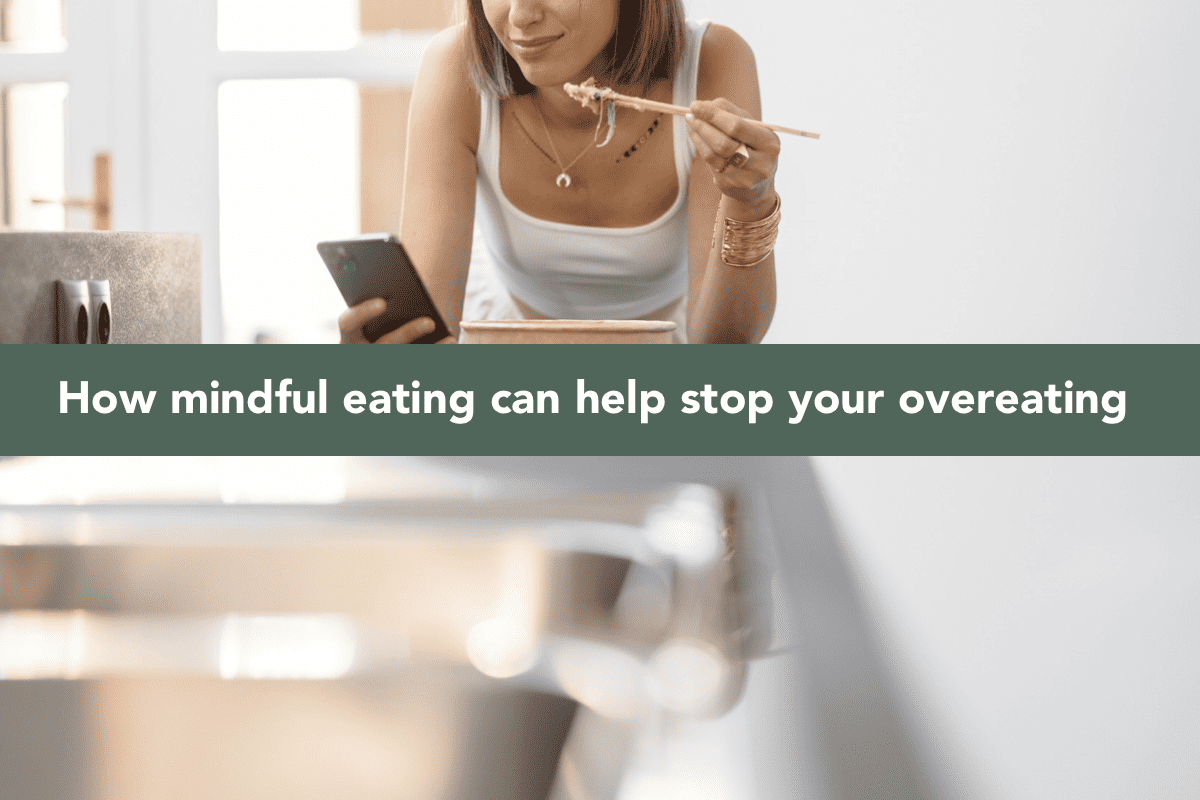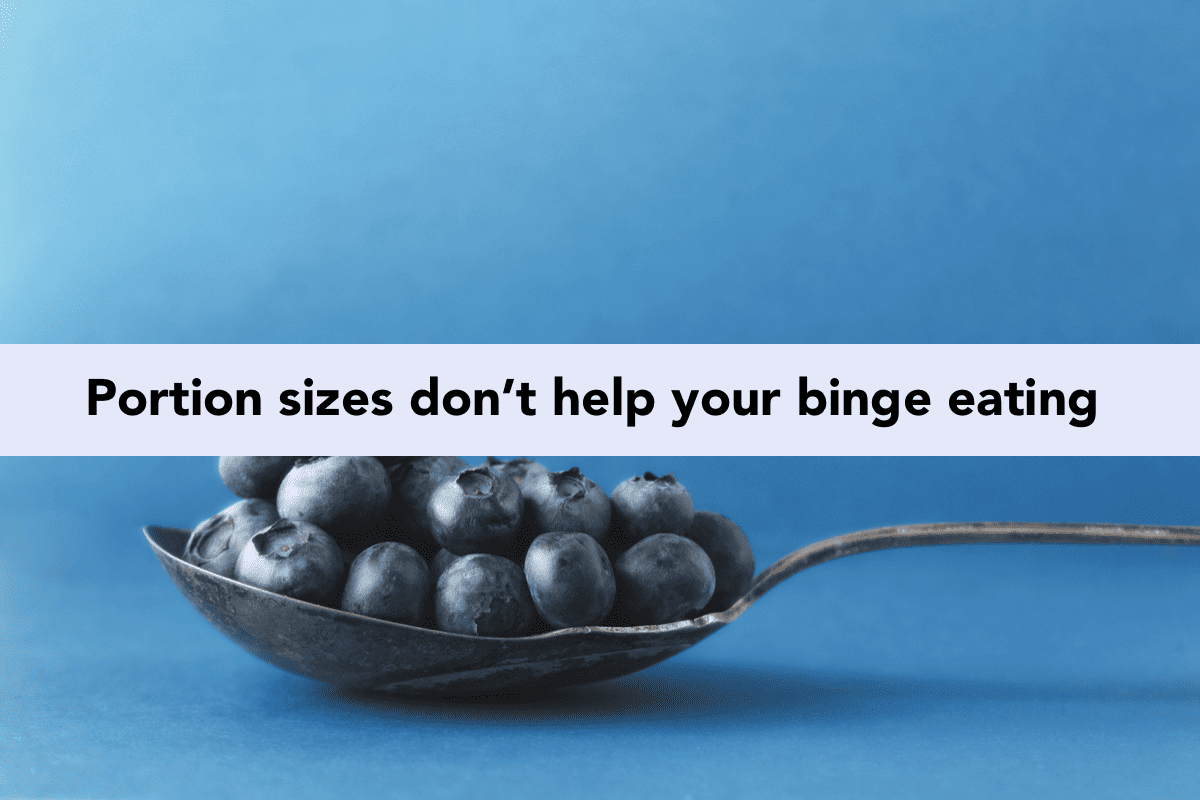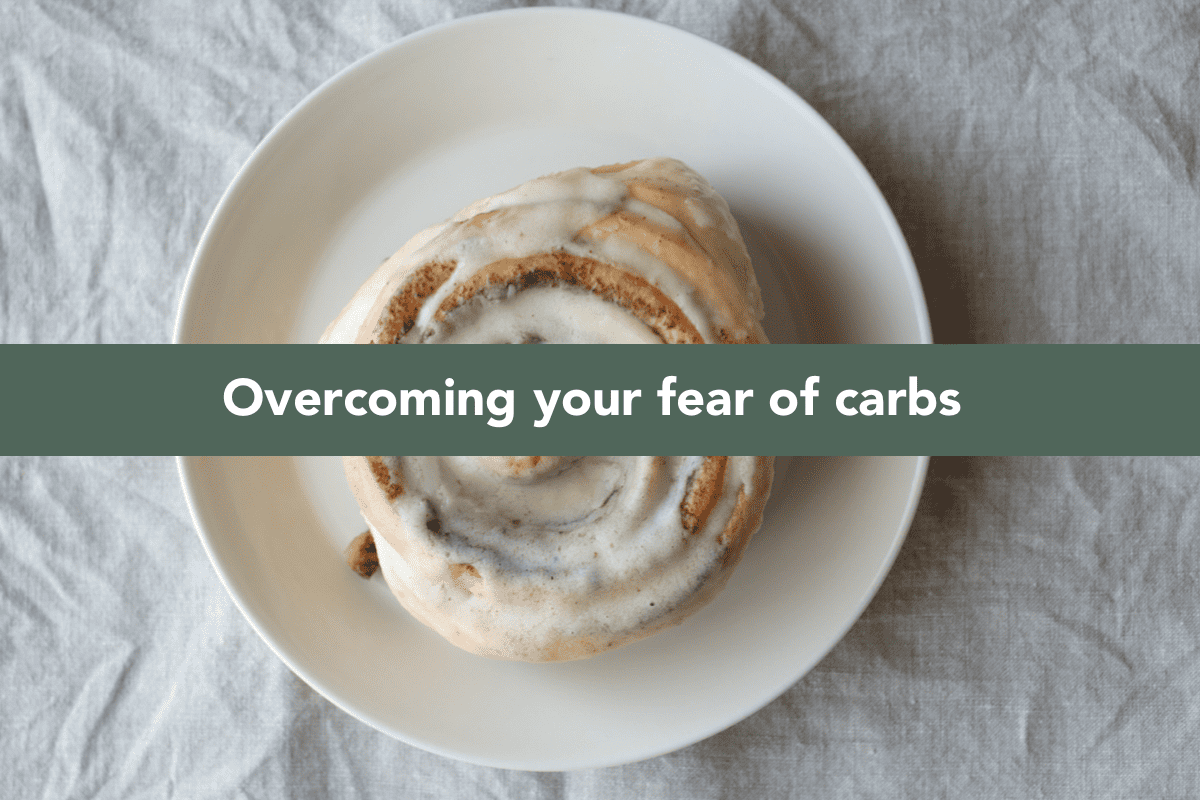When people first start working with me for binge eating as their Dietitian, they really just want to know how to stop. But it is first important to uncover the WHY — why the binge eating started in the first place. There are a few main reasons I have identified through research, personal experience, and experiences with my clients. I want to share those reasons with you in hopes that you can uncover the source of your binge eating so you can come up with a game plan to move forward in finding binge freedom. Essentially all three of these reasons are linked. By solving one you’re helping another.
Let’s dive right in!

Restriction.
The first and most well-known reason for binge-eating is restriction. Restrictive eating creates physical and psychological deprivation, which naturally and eventually leads to binge eating.
Now, what classifies as a restriction in this case? Restriction includes restricting calories, macros, or restricting or eliminating major food groups such as carbs, fat, or sweets.
Let’s talk more about staying in a caloric deficit, as this is often the state people want to be in when they are trying to lose weight. We hear it all the time, just count your calories, stay in a caloric deficit and you will lose weight. While that is true the reason why most caloric deficits are not sustainable is that when we live in a constant caloric deficit, our body is going to fight back. Our body doesn’t want to be in a caloric deficit because those calories are needed for basic functioning and energy. Our body sees a caloric deficit as a famine. Internally, our body has no idea you’re just doing keto or tracking what you eat on My Fitness pal to eat less, it only knows that it’s not getting what it wants or it needs to fuel the day. Our body fights back in many different ways to get what it needs, one is by bingeing. The binge-restrict cycle could also be described as the feast-famine cycle. It’s no wonder we binge-eat if our body believes we are in a famine.
When our body goes into a famine, when we finally are around food or give in to those off-limit foods, we have this uncontrollable feeling to eat. It overtakes us to where the binge begins. It should be noted this is not your fault. It is truly physiological. The binge is a protective measure to make sure you get enough energy to maintain your body’s processes. This is why women often lose their periods when they’re in an extreme caloric deficit because the body needs to use the calories it does have to maintain essential organ function, and technically the reproductive system is not essential so it stops the menstrual cycle to reserve calories.

On top of that, when we chronically undereat, our hunger and fullness hormones get out of whack. Our hunger and fullness hormones are called ghrelin and leptin. When we under eat, the hormone that regulates our hunger, ghrelin, increases. Making the feeling of hunger more prominent. Meanwhile, the hormone that controls our fullness, leptin, decreases. So even if we feel physically full in her stomach, the hormone that is supposed to let our brain know that we are finished eating and we are full is not there. This is why you get that uncontrollable feeling to not stop eating even when you feel physically stuffed. And so the binge continues. This is really frustrating because you feel as though it is mental. It’s all in your willpower and so you place further restrictions on yourself and PROMISE that this time it will be different. However, continued restricted eating further erodes actual control one might have over their food intake. It is not surprising that clients believe any attempt to eat normally only leads to bingeing after this cycle digs deeper and deeper. In this mindset, one has no choice but to continue restrictive eating in order to maintain a hold on the self-control that they feel they’ve lost when the binges ensue. But it really isn’t willpower. Your body is trying to protect you and this binge is that protective measure. Continuing the restriction only perpetuates further binges. That’s why it’s called the restrict-binge cycle.
So how long does the Restriction have to last in order for it to need to binge eating? I really think it depends on the person. If you are prone to binge eating, even a day or two of restrictive eating could trigger a binge. But for those that have never binged before, empirical evidence leads us to expect that restrictive food behaviors that are maintained for about 6 months or longer will lead to binge eating.
I can already hear your next question, how much of a caloric deficit could trigger this? Well in the Minnesota Starvation Experiment on 36 men, the men were only restricted to 1,570 calories. Not really what you’d think of as “starvation” since most weight-loss diets will recommend even as low as 1200! Being in this deficit for 6 months increased their behaviors of binge eating. Now, this is just 1 study and there are not many studies out there pointing to a specific number of calories or percentage of a caloric deficit, so it’s important to note that it’s truly different for everyone and their needs. From my clinical judgment, I think a lot of it comes from the mental intention of the restriction, which leads me to my next point…

Mental Food Rules
The second reason is somewhat of a subcategory of the reason for restriction but can be a book in and of itself. This is often where a lot of my clients are stuck when they come to me. They say “I’ve stopped restricting, I’m not dieting, I think I’m eating enough, so why can’t I stop bingeing?” This is usually when I uncover that they are still holding onto mental food rules.
Mental Foods rules sound something like this: “I can have the Oreos, but only two. I shouldn’t be hungry, I just ate! I can eat carbs, but not after five”. These are really sneaky rules because they don’t sound like the black and white restrictive dieting rules we are used to. It’s not low carb, only x amount of macros Etc. They are almost conditional rules. I find the most prominent mental food rules that keep clients bingeing is the should talking. I should do this, I should do that, I shouldn’t have done this, the list goes on and on. This is a sense of doubt in the trust we have in ourselves.
We have to build back that body trust in order to stop the binge cycle. This starts from the outside in. We have to believe that we trust ourselves for our body to believe it. So if we are constantly second-guessing our intuition and should talk in ourselves, we are instilling that we do not trust ourselves. Listen to your body at every moment. If you’re hungry and you just ate half an hour ago, then you’re just hungry. There is no should about it. If today you ate more than yesterday, then today you needed more than yesterday. You shouldn’t have eaten less, because your body told you you needed more. Of course, that’s simpler said than done, but identifying if you are wrapped up in mental food rules or “should” talk will help you understand why you may still be bingeing.
Some other examples of mentalities that get you into trouble with binge eating would be the “all-or-nothing mindset” and the “farewell to food feast”.
The “all-or-nothing mindset” is that mindset where when you have one thing that’s even a little off-limits or a little out of your diet, you think well screw it! I’ve already blown it. And then you eat through your entire pantry the rest of the day. It’s like when you can’t just have one donut for breakfast without eating the entire box. It’s either you’re all on the diet, or you’re all off of it. There is no in the middle.
The “farewell to food feast” is what happens when you are anticipating food restriction, such as when you are starting your new diet on Monday and so you spend all Sunday going crazy eating all of the foods you won’t have access to starting tomorrow. If you’re swearing off carbs, you’ll find yourself on Sunday eating any and all carbs you can get your hands on.

There was a really clever study done on chocolate lovers where they told them they would be not allowed to eat chocolate for 3 weeks. What they found was that before the study began and after the study completed these participants who usually had a pretty modest intake of chocolate actually increased their intake before and after. This just shows that the anticipation of the restriction alone can lead to overeating or bingeing, A farewell to food feast.
These are just a few ways our mentality alone can keep us stuck bingeing. Moving onto the 3rd reason!

Fear of weight gain
This last reason is really interesting. It’s the fear of weight gain. The reason why this may perpetuate the binge cycle is that you don’t fully allow yourself to eat enough, or fully listen to your body. If you’re constantly in a state of fearing potential weight gain, you may consciously or subconsciously undereat or try to control your intake.
Going back to the first two reasons, this fear of weight gain could initiate either the restriction or mental food rules. What happens if you have a fear of weight gain and then one day you feel a bit hungrier than usual. You find yourself craving larger portions because that is how much you feel you need that day. But you try to resist a little bit because you’re scared that eating the larger portions will contribute to weight gain. By resisting, you are giving into restriction or mental food rules which can then lead to bingeing. Essentially the fear of weight gain itself doesn’t necessarily cause the bingeing, it’s the actions and mental states that usually follow that ultimately lead back to the binge.
This fear of weight gain is a learned belief though, meaning that it’s not REALLY about your body, it’s about your belief system. Shoutout to Bri Campos here for that insight!
This belief system starts in our home life but is EVERYWHERE in society through social media, television, magazines, moves, etc. so it’s clearly not your fault that the fear is there! Although we cannot change society (even though we sure as hell can try) we can work towards creating a more compassionate and helpful inner dialogue to build a stronger belief system around our body.
Now if this fear is less aesthetic and more health-related, I want to remind you that weight does not necessarily equate to health. Research shows that living in a bigger body is actually better for your health than constantly weight cycling as you go on and off diets. So if your set point weight is a bit higher than you think is healthy, remember that fighting your body to be smaller than it wants to be is more unhealthy than just living your life in a bigger body size. So you can participate in healthful behaviors you enjoy that add value to your life to support your best health without making it all about your body. Focusing on behaviors is more sustainable anyway, and weight is NOT a behavior.

This list is in no way all-inclusive. Everybody is different, binges start and continue for a multitude of reasons. If you’re feeling stuck that’s why it’s important to work with a professional to identify why it’s happening so you can strategize how to stop. This list may be the top three reasons I see my clients continue to binge-eat, but that does not inherently mean that this is a reason why you continue. I work with many of my clients to first and foremost problem solve the “why”, then strategize many different ways to overcome the bingeing and come up with an individualized action plan to move forward in cultivating a healthful relationship with food and their body.








